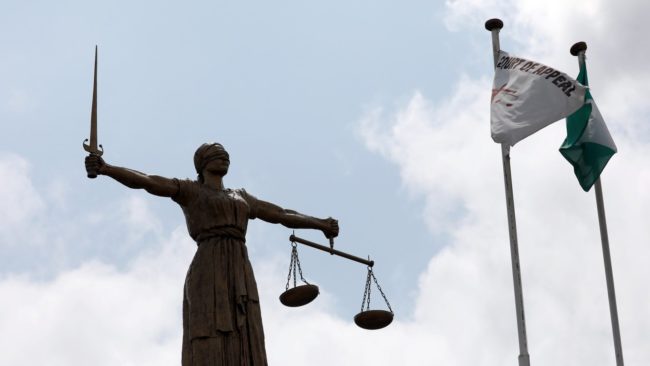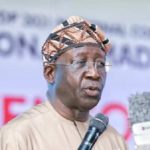THE Court of Appeal, Abuja Division, on Wednesday, set aside the judgment of the Federal High Court in Umuahia, Abia State, which voided the provision of Section 84(12) of the Electoral Act 2022.
A three-member panel of justices of the appellate court headed by Justice Hamma Akawu Barka held in a unanimous judgement that the Federal High Court, Umuahia had no jurisdiction to have entertained the case in the first place.
This, the court of appeal held, was because the plaintiff, Nduka Edede, had no legal right to file the suit and that he did not establish any cause of action to have warranted him approaching the court on the issue, because he did not establish that he was directly affected by the provision.
The court then struck out the suit marked: FHC/UM/ CS/26/2022 which Edede filed before the Umuahia court and, while determining the appeal on the merit, it, however, held that the provision is unconstitutional because it violates Section 42(1)(a) of the Constitution and denied a class of Nigerian citizens their right to participate in election.
The judgment was on the appeal brought before the court by the Peoples Democratic Party (PDP).
ALSO READ FROM NIGERIAN TRIBUNE
“I agree with the appellant that, from the first respondent’s (Edede’s) affidavit in support of the originating summons, no discernible personal interest enuring to the first respondent has been shown.
“To that end, I am in full agreement with the counsel for the appellant that the first respondent, in this circumstance, lacked the requisite locus standi to have initiated the action before the lower court and robbed the court the jurisdiction to entertain the suit.
“In short, all I have been saying is that owing to the fact that the first respondent lacked the locus standi to sue, there being no right of action to institute same, the lower court has no jurisdiction to have entertained the suit and thereby laboured in vain.
“The resultant effect is that the action before the lower court is liable to be struck out and it is accordingly struck out,” Justice Barka, who read the lead judgment, said.
He added that, “Ordinarily, this ought to have settled this instant appeal. But, we are very conscious of the fact that the decision of this court may not be the final decision on the issue, this being a penultimate court.
“Although there are divergent views on what this court should do in the circumstance, having arrived at the decision that the lower court lacked the necessary jurisdiction to entertain the action, in the first leg; we see the need and the duty to avail the apex court a view on the matter being agitated,” Justice Barka said.
He then proceeded to determine the case on the merit and held that the provision is unconstitutional because it violates Section 42(1)(a) of the constitution and denied a class of Nigerian citizens their right to participate in election.
Justice Barka said: “It is my view that the provision of Section 84(12) of the Electoral Act 2022 specifically targets political appointees and disqualified them from being voting delegates or from being voted for at convention or congress of any political party for the purpose of the nomination of candidates for any election.
“This provision does not disqualify any other class of people. It is my view that political appointees fit into the term: community in Section 42(1)(a) of the constitution as members of that group share the same job and, therefore, the same political interest.
“Section 84(12) of the Electoral Act expressly subjects them to disabilities and restrictions from other citizens of Nigeria, other communities, political interests and political views and thereby contravenes the provision of Section 42(1)(a) of the Constitution and thereby null and void,” he said.
Other members of the panel, Justices U. E. Ekanem and Mohammed Mustapha, agreed with the lead judgment. Reacting to the judgment, the senator representing Taraba South senatorial district on the platform of All Progressives Congress (APC), Emmanuel Bwacha, said the court ruling was in order and would further strengthen the nation’s democratic process.
He stressed that it is normal for any political appointee to resign his position before venturing into elective office in the interest of fair play.
WATCH TOP VIDEOS FROM NIGERIAN TRIBUNE TV
- Relationship Hangout: Public vs Private Proposals – Which Truly Wins in Love?
- “No” Is a Complete Sentence: Why You Should Stop Feeling Guilty
- Relationship Hangout: Friendship Talk 2025 – How to Be a Good Friend & Big Questions on Friendship
- Police Overpower Armed Robbers in Ibadan After Fierce Struggle






